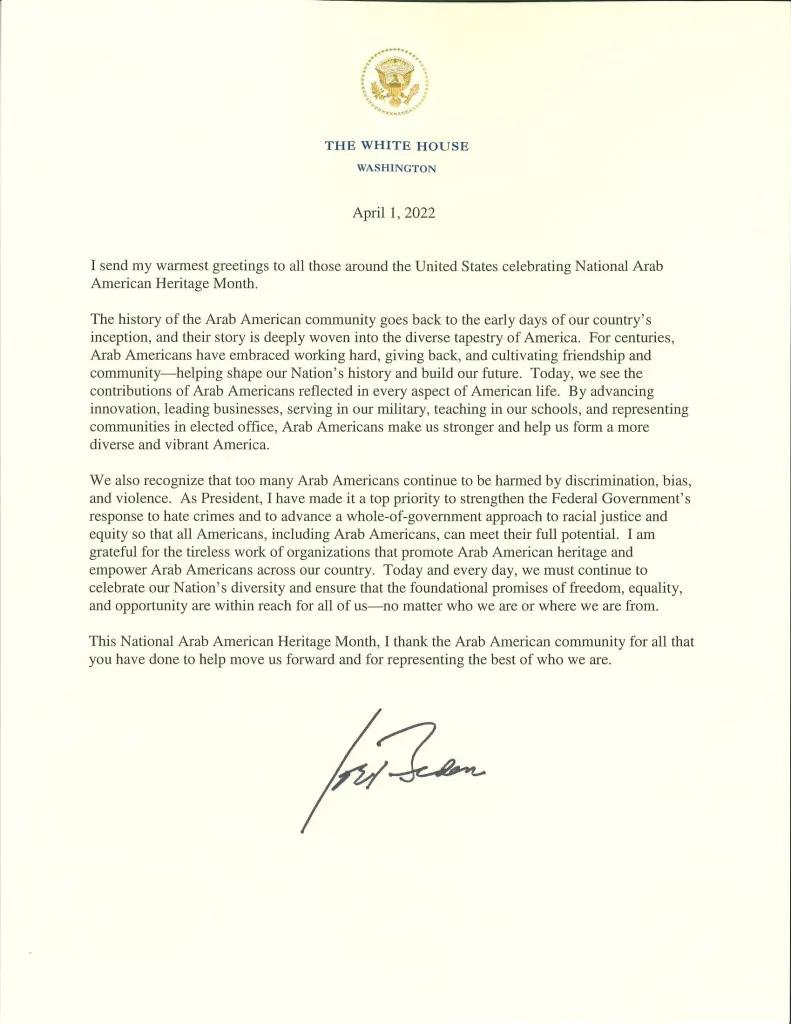2 minute read
National Arab American Heritage Month: A History
Next Article
The first National Arab American Heritage Month (NAAHM) Celebration took place in Washington, D.C. in April of 2017
The Arab America Foundation (AAF) is launched and receives 109 proclamations and resolutions, representing 26 states, affirming NAAHM
Proclamations and resolutions commemorating NAAHM are issued by school systems and government officials in Virginia, Maryland, Michigan, and California

For the first time, the President of the United States recognized April as NAAHM. That same year, Arab America received 130 proclamations and resolutions from 45 states
During the height of the COVID-19 pandemic, 22 proclamtations from state governors were received
AAF is seeking recognition from all 50 states. Permanent initiatives have begun in New Jersey, Ohio, Michigan, California, and Rhode Island
A record number of citations were received, with 144 proclamations and resolutions from 45 state governors. Illinois, Oregon, Virginia and Indiana passed permanent legislation designating April as NAAHM
None of this success would have been possible without Arab America’s grassroots network of over 250 Arab American volunteers in 28 states, gathering a large number of proclamations from organizations in their states, counties, municipalities, local school districts, and of course, governors. This year, we have already made history by receiving a proclamation from Alaska’s state governor for the first time.
Implications
While this increased recognition of Arab American Heritage is exciting and long overdue, Warren David explained that the designation of National Arab American Heritage Month is larger than it appears: “NAAHM is a movement to reclaim narrative, history, language, music, food, and to exercise our civic duty as Arab Americans.” Dr. Amal added that while it increases our sense of pride in our community, NAAHM is also about educating non-Arabs in the U.S., citing her background in education.
She passionately emphasized that what motivates her to continue promoting NAAHM is the idea of educating non-Arabs on the legacy of Arab Americans, and that depriving the younger generation of Americans of an understanding of Arab American heritage is a disservice to them both, Arab and non-Arab children alike. She went on to emphasize the importance of allowing young Arab children to be “proud of their identity, and to see people like them and their ancestors represented in the classroom and beyond.”


When asked about the obstacles they faced in working to establish National American Heritage Month, the Davids admitted they experienced more than their fair share of hate messages and backlash. However, as Mr. David put it, this negativity was “the exception, not the rule,” and overall AAF has received overwhelming support, both moral and financial, from the community, private donors, and other organizations.
Legacy
This past April we recognize that National Arab American Heritage Month holds immense significance, both for Arab Americans and non-Arab Americans alike. By “being true to our ancestors,” as the renowned Lebanese poet and philosopher Khalil Gibran stated, we stay true to ourselves and build future generations of proud Arab Americans.

